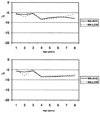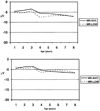Development of auditory event-related potentials in young children and relations to word-level reading abilities at age 8 years
- PMID: 15765002
- PMCID: PMC2729145
- DOI: 10.1007/s11881-004-0002-3
Development of auditory event-related potentials in young children and relations to word-level reading abilities at age 8 years
Abstract
A relationship between brain responses at birth and later emerging language and reading skills have been shown, but questions remains whether changes in brain responses after birth continue to predict the mastery of language-related skills such as reading development. To determine whether developmental changes in the brain-based perceptual skills are systematically related to differences in word-level reading proficiency at age 8 years, brain event-related potentials (ERPs) to speech and non-speech stimuli were recorded annually at the ages of 1 through 8 years in a sample of 109 typically developing children. Two measures of word-level reading (one that requires decoding of real words and one of pseudowords) were administered at age 8 years. Growth curve analysis, using the hierarchical linear models, related reading performance (average versus low) to the longitudinal maturation in the ERP waveform peak and latencies. Maturational changes (e.g. slope, acceleration and cubic growth) in N1 amplitude from ages 1 to 4 were related to proficiency in decoding pseudoword stimuli only, with children who were less proficient in decoding pseudowords evidencing more steeply negative declines in amplitude with age, particularly at the frontal and parietal recording sites in response to both speech and non-speech stimuli. In contrast, proficient in decoding real words was related to developmental changes in N2 amplitudes from ages 4 to 8 only at the parietal recording site and only in response to non-speech stimuli. The early development of biologically-based differences in the perception and processing of auditory information contributes to later group differences in reading proficiencies at school age.
Figures






References
-
- Brady S. The role of working memory in reading disability. In: Brady S, Shankweiler D, editors. Phonological Processes in Literacy: A Tribute to Isabelle Y. Liberman. Hillsdale, NJ: Erlbaum; 1991. pp. 129–161.
-
- Cutting J. Two left-hemisphere mechanisms in speech perception. Perception & Psychophysics. 1974;16:601–612.
-
- Denton K, West J. Children's Reading and Mathematics Achievement in Kindergarten and First Grade. Washington, DC: U.S. Department of Education, National Center for Education Statistics; 2002.
-
- Eilers R. Context-sensitive perception of naturally produced stop and fricative consonants by infants. Journal of the Acoustical Society of America. 1977;61:1321–1336. - PubMed
-
- Eilers R, Wilson W, Moore J. Developmental changes in speech discrimination in infants. Journal of Speech and Hearing Research. 1977;20:766–780. - PubMed
Publication types
MeSH terms
Grants and funding
LinkOut - more resources
Full Text Sources
